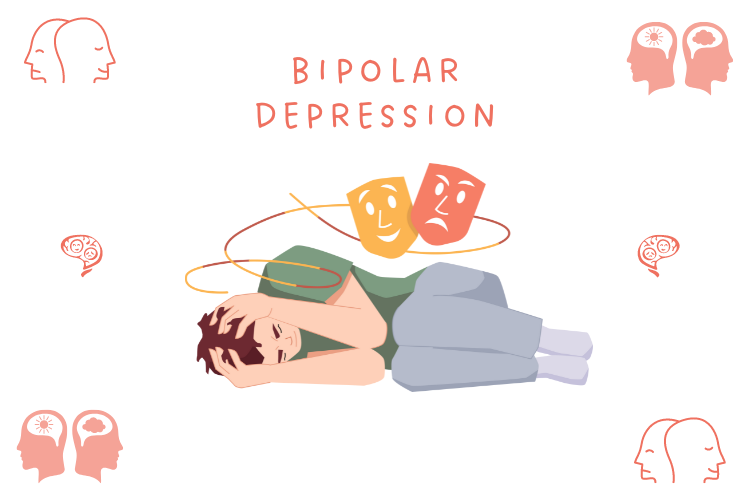Bipolar depression is a complex mental health condition that affects millions of people worldwide. Formerly known as manic depression, this disorder is characterized by extreme mood swings, ranging from depressive lows to manic highs. Individuals with bipolar depression often find themselves on an emotional roller coaster, experiencing intense periods of sadness, hopelessness, and fatigue followed by bursts of elevated energy, impulsiveness, and euphoria. In this blog, we will explore the various aspects of bipolar depression, including its symptoms, causes, diagnosis, and available treatment options, while shedding light on the importance of understanding and supporting those living with this condition.
Understanding Bipolar Depression
1. Types of Bipolar Disorder:
Bipolar disorder is divided into several types, including Bipolar I, Bipolar II, Cyclothymic Disorder, and unspecified bipolar disorder. Each type is characterized by distinct patterns of mood episodes, duration, and severity.
2. Depressive Episodes:
Depressive episodes in bipolar depression are akin to major depressive disorder. During these periods, individuals experience feelings of sadness, hopelessness, loss of interest in activities, changes in appetite, sleep disturbances, and low energy levels. Thoughts of worthlessness and suicidal ideation may also occur during severe depressive episodes.
3. Manic or Hypomanic Episodes:
Manic or hypomanic episodes are the polar opposite of depressive episodes. In Bipolar I, manic episodes are intense and disruptive, often leading to reckless behavior, grandiosity, decreased need for sleep, and impaired judgment. In contrast, Bipolar II experiences hypomanic episodes that are less severe but can still cause difficulties in daily functioning.
Causes of Bipolar Depression
The exact causes of bipolar depression remain unclear, but research suggests that various factors contribute to its development. These include:
1. Genetics: A family history of bipolar disorder increases the likelihood of developing the condition.2. Biological Factors: Neurotransmitter imbalances, hormonal irregularities, and changes in brain structure may play a role in the onset of bipolar depression.
3. Environmental Triggers: Stressful life events, traumatic experiences, and substance abuse can trigger mood episodes in individuals predisposed to the disorder.
Diagnosis and Treatment
Diagnosing bipolar depression can be challenging due to the complexity of its symptoms and similarities with other mood disorders. Medical professionals typically rely on a comprehensive evaluation that includes a thorough medical history, psychiatric assessment, and discussions about family history and life experiences.
1. Medication: Medications such as mood stabilizers, antipsychotics, and antidepressants are commonly prescribed to manage symptoms and stabilize mood swings. It's essential to work closely with a healthcare provider to find the most effective medication and dosage for each individual.2. Psychotherapy: Cognitive-behavioral therapy (CBT), dialectical behavior therapy (DBT), and other forms of psychotherapy can be beneficial in helping individuals cope with the emotional challenges of bipolar depression and learn healthy coping mechanisms.
3. Lifestyle Changes: Maintaining a stable daily routine, engaging in regular exercise, getting sufficient sleep, and avoiding substance abuse can help manage mood swings and improve overall well-being.
Support and Understanding
Living with bipolar depression can be overwhelming for both individuals and their loved ones. It is crucial to foster a supportive environment that encourages open communication, empathy, and understanding. Educating oneself about the disorder can lead to reduced stigma and increased compassion for those experiencing bipolar depression.
Conclusion
Bipolar depression is a serious and challenging mental health condition that requires proper diagnosis, treatment, and support. With a combination of medication, therapy, and lifestyle changes, individuals with bipolar depression can lead fulfilling lives and better manage their emotional fluctuations. By promoting awareness and empathy, we can collectively work towards reducing the stigma surrounding mental health and create a more inclusive society for everyone. Remember, seeking professional help and support is the first step towards recovery and living a life beyond the shadows of bipolar depression.



